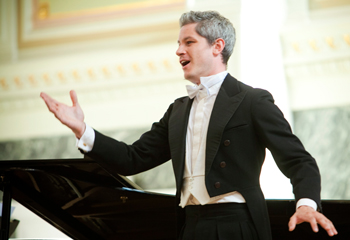by Daniel Hathaway
Art
Those who flipped the coin in Crossley-Mercer’s favor were in for a memorable afternoon of singing by a splendid up-and-coming French singer enhanced by the superb artistry of Russian pianist Semjon Skigin. In songs by Beethoven, Brahms, Vaughan Williams, Fauré, Debussy and Poulenc, Crossley-Mercer and Skigin showed a good-sized audience how eloquent one singer and one pianist can be.
The only reason to set poetry to music is to add further value to the texts. The only reason to gather a group of listeners in a room and sing to them is to communicate the meaning of those musicalized words, which the singer should know and cherish and put across vividly. The most successful art song singers are those who are willing to bend their voices around the words. Though often there are happy or ecstatic emotions to be expressed, sometimes singers need to sound angry, despairing, desolate, or any of a thousand stages on the emotional continuum.
Edwin Crossley-Mercer is an expert at doing that, and Semjon Skigin can shadow his every nuance. Turning the piano at an angle allowed more than the normal, peripheral eye contact between the two musicians and also gave Crossley-Mercer a piece of furniture to lean on when his conversation with the audience turned particularly intimate, making you feel you might have been in a drawing room with him rather than in a large auditorium.
The baritone immediately revealed his artistry in Beethoven’s An die ferne Geliebte, six connected songs addressed to a distant lover. Singing with a creamy legato one moment then almost staccato the next, Crossley-Mercer gave special attention to individual words and phrases — Liebesgewalt (“power of love”), Klagt ihr (“Lament to her”), stillen blauen See (“calm blue lake”) — and dramatized others with subtle hand motions (pointing at the hilltop where the last ray of the sun was dying). After exploring every dynamic level, adding or subtracting vibrato and often floating phrases in a near-whisper, Crossley-Mercer ended the Beethoven set with strong, full-voiced singing that filled the hall with masculine, resonant tone.
All these traits illuminated six more varied lieder by Brahms. Crossley-Mercer reveled in the repetition of Blaugrau (Blue-grey) in Tambourliedchen, wafted away the evanescent melody of Wie Melodien zieht es mir with a puff of breath on his fingertips and exulted in the love-intoxicated heartiness of Meine Liebe ist grün. Playing with dark, rich tone, Skigin held the mood for a long moment at the end of each song, making each piece its own, special scene.
After intermission, Crossley-Mercer flipped his linguistic switch to offer songs in English and French — something he does easily as the son of Irish and Alsatian German parents who grew up in France and studied in Berlin.
Crossley-Mercer chose four songs (“only the most beautiful ones”, he said in an interview) from Ralph Vaughan Williams’s affecting Songs of Travel, to poems of Robert Louis Stevenson. Taking advantage of Stevenson’s sometimes clipped phrases, he punched out lines like “Wealth I ask not, hope nor love”, but found the hearty cheerfulness in “The Roadside Fire” and the pathos in “Whither must I wander”.
A selection of French songs by Fauré, Debussy and Poulenc concluded the program. Here Crossley-Mercer and Skigin explored the beauty of long, flowing melodic lines (Fauré’s Au bord de l’eau), ironic humor (Debussy’s Chevaux de bois, about a carousel) and depair (Poulenc’s Les chemins de l’amour).
The audience couldn’t get enough of Crossley-Mercer’s singing and called him back for two encores. Now he pulled us into a different world altogether — a dark café scented with Gauloises with glasses of Pastis on the tables — for a sultry baritone version of C’est si bon (popularized in the States by Eartha Kitt) and an intimate performance of the wistful Les feuilles mortes (originally a French song before Johnny Mercer turned it into Autumn Leaves).
Alas, Edwin Crossley-Mercer didn’t program a baroque opera aria on Sunday afternoon — one of his specialties and an area in which he’ll be increasingly visible in the future. Watch for his forthcoming roles in Rameau’s theater works. Here’s a baritone the world will be seeing and hearing more and more. A big round of applause to the BW Art Song Festival leadership for discovering him and giving him his U.S. recital debut in Cleveland.
Published on ClevelandClassical.com March 5, 2013
Click here for a printable version of this article.



